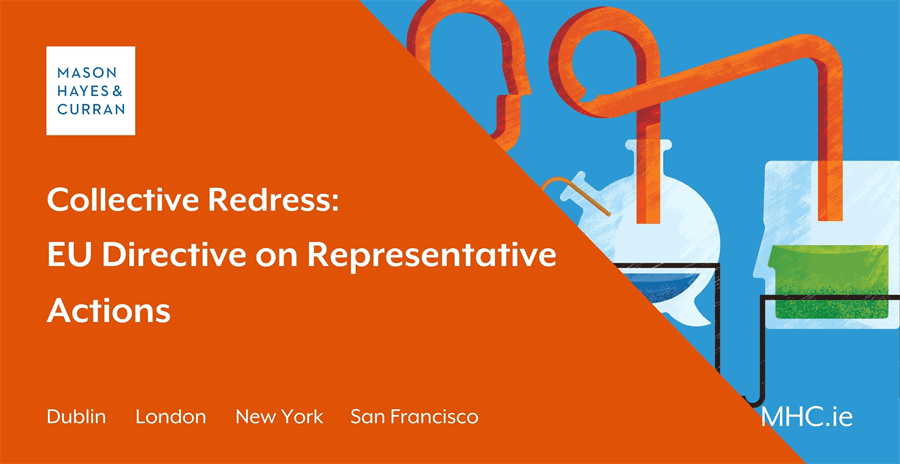Collective Redress: EU Directive on Representative Actions

A recent industry study reported that the number of class actions filed across Europe rose by over 120% between 2018 and 2020. Consumer and data protection class actions featured heavily in the increased number of claims. As a common law jurisdiction, and now the only one left in the EU/ EEA, Ireland has always been in a good place to have your dispute. One area where Ireland has lagged behind other EU jurisdictions is in the area of class actions, and in particular collective consumer redress. That historic position is about to change.
EU Directive 2020/1828 on representative actions for the protection of the collective interests of consumers (Directive on Representative Actions) was published on 4 December 2020. Ireland and the other Member States are required to adopt implementing measures by 25 December 2022 and the measures will apply from 25 June 2023.
Once it comes into effect, it will harmonise the regime for collective actions to be brought on behalf of EU consumers. It also aims to balance the availability of the mechanism across Member States while providing safeguards to prevent frivolous claims against traders. To distinguish the EU regime from the more litigious US class action procedure, the criteria required in the Directive to bring a redress action are relatively strict.
Qualified entities
The Directive requires each Member State to designate at least one ‘qualified entity’ to bring actions on behalf of consumers. A list of qualified entities will be maintained by the European Commission. Qualified entities, such as consumer organisations, will be empowered to bring collective action cases on behalf of consumers for breaches of a wide range of EU Directives and Regulations. Member States will have a high level of discretion in selecting the criteria that qualified entities must meet for the purpose of bringing domestic representative actions.
In order to bring a cross-border representative action, the qualified entity will have to meet certain criteria:
-
Be a non-profit organisation in the area of consumer protection
-
Be independent
-
Have a legitimate interest in ensuring that there is compliance with the provisions of the Directive
-
The CCPC is likely to be a qualified entity in Ireland
The Irish position
Ireland does not have a compensatory collective redress procedure. There are currently no comprehensive provisions in Irish court rules for tackling class claims in a consistent manner. Instead, a range of somewhat unwieldy procedural options are available to allow claims involving multiple parties to be litigated as private actions.
Once implemented, the Directive on Representative Actions will require Ireland to introduce at least one representative action procedure for injunction and redress actions which can be brought by qualified entities.
Impact on the product and consumer sector
The infringement by traders must be related to claims arising under any of the 66 European directives and regulations specified in Annex I to the Directive, along with their national implementing measures. In order to capture a number of sectors, these directives include:
-
The General Product Safety Directive
-
The Digital Content Directive
-
The Sale of Goods Directive
-
The GDPR
-
The Directive on Liability for Defective Products
-
Medical Devices Regulations
-
EU Regulations on Medicinal Products for Human Use
Current opportunities for consumers to bring proceedings against digital service providers are limited, expensive and time-consuming with limited potential benefit in terms of compensation by the end of the process. However, once Member States have applied the measures of the Directive on Representative Actions, this is likely to greatly increase the enforcement of consumer rights across the EU.
For example, if a wearable product has safety issues under the GPSD and a large number of consumers complain to a qualified entity, it will be able to bring a collective action against the manufacturer for alleged infringements of the GPSD. In some instances, qualified entities will be able to bring a joint representative action along with consumer protection groups and NGOs from other Member States if there is an EU-wide issue.
Injunctions and consumer redress
Qualified entities will also be able to apply for injunctive relief and other redress, with injunctions potentially being granted on a preventative or prohibitive basis. In addition, qualified entities may seek redress on behalf of consumers in the form of compensation, repair, replacement, price reduction, contract termination or reimbursement. The redress awarded could vary among consumers in the group or could be the same for all consumers involved in the action. Member States will be given some flexibility as to how this will operate, and will be able to decide to either opt-in, ie. consumers actively opt-in to being represented, or to opt-out, ie. a consumer must express their desire not to be represented by a qualified entity. For cross-border actions, only the opt-in basis will be available.
Safeguards
One of the important features of the Directive on representative actions are the safeguards which were introduced in order to ensure the system does not encourage frivolous lawsuits. These include:
-
Loser pays principle: The costs of the proceedings should be borne by the unsuccessful party.
-
Dismissal of manifestly unfounded cases: Courts will also be willing to dismiss manifestly unfounded cases at the earliest possible stage of the proceedings.
-
Settlement: There is also the possibility that a claim can be settled. However, such a settlement requires the approval of the court.
-
Third party funding: A qualified entity will be required to publicly disclose information about its sources of funding for the representative actions it brings. It is important to note that at present, third party funding in Ireland is prohibited.
-
Multiple claims by individual consumers: Member States will be required to lay down rules preventing consumers from bringing an individual action or being involved in another collective action against the same trader for the same infringement. Furthermore, Member States must ensure that consumers do not receive compensation more than once for the same cause of action against the same trader.
What’s next?
Member States are required to adopt implementing measures by 25 December 2022 and the measures will apply from 25 June 2023.
On 15 March 2021, the Department of Enterprise Trade and Employment launched a public consultation seeking submissions as to how certain aspects of the Directive should be transposed into Irish law. It is notable that in launching the initiative, the Minister for Trade Promotion, Digital and Company Regulation stated that, ‘This will be a first in Irish law, as such procedures are not currently in place here. My Department and relevant stakeholders have a significant job of work to do to design the procedural mechanism for collective representative actions required by this Directive.’
While it remains to be seen how it will be implemented in practice, businesses subject to EU regulation should begin to prepare for an inevitable increase in both domestic and cross border consumer litigation.
For more information, please contact a member of our Dispute Resolution team.
The content of this article is provided for information purposes only and does not constitute legal or other advice.
Share this:


